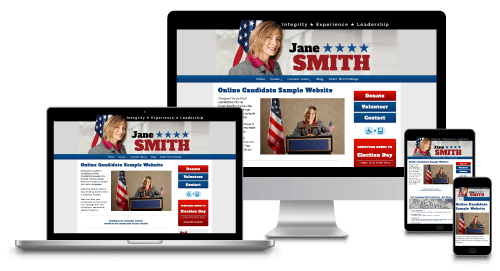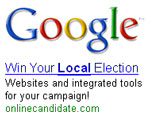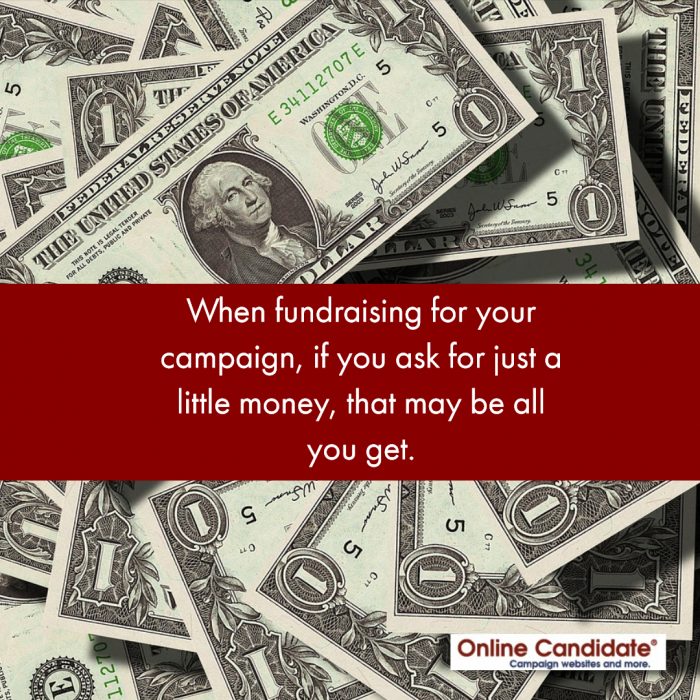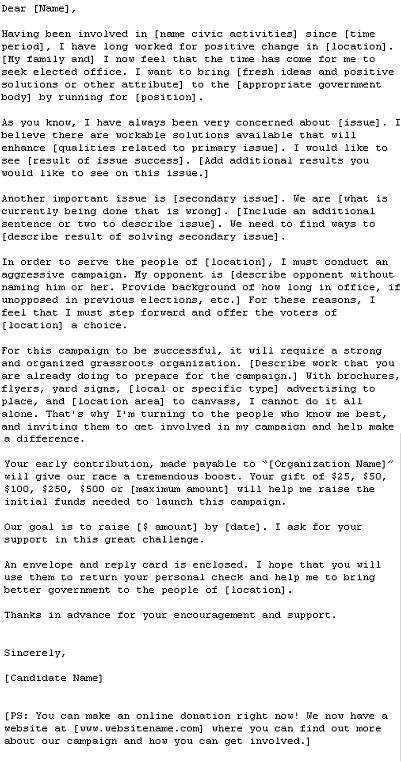When To Start Your Political Campaign Website
Once you’ve decided to run for office, when should your political campaign website be started? The short answer is as early as you can.
In fact, the process of building a political website will force you to pull together elements you will later need for your print materials and signage. This material includes:
- A logo design
- Candidate photos
- Content, including your candidate bio and issue positions
Putting together the content for a site will actually help pull together the larger elements of your voter advertising.
Have a primary to win?
A website could make all the difference, particularly in local elections. Turnout for primary elections are usually low, and because of this, every vote counts.
Two types of people vote in primary elections
Those people are dedicated party supporters and those who take their voting privileges seriously. Just 20% of eligible voters vote in primaries, and they tend to be more highly partisan than the average voter. Putting up a campaign website during a primary gives the impression that a candidate is in the race for the long haul.
Securing a domain name early gives you an opportunity to promote the site in every piece of campaign literature right from the start. Online information can help influence primary voters who seek out information about the candidates. Once a primary is over, the site content can be expanded and modified to focus on the general election audience.
 Waiting until the last minute or following an opponent’s lead limits a campaign website’s effectiveness. By holding off, you’ve lost an opportunity to influence voters. It takes time to build online support, not only through a website, but through social media and other online advertising channels.
Waiting until the last minute or following an opponent’s lead limits a campaign website’s effectiveness. By holding off, you’ve lost an opportunity to influence voters. It takes time to build online support, not only through a website, but through social media and other online advertising channels.
By starting late, you will have little time to promote your new site. Just building out a campaign site in response to an opponent’s site can look to many as if you’re simply following the others’ lead. A ‘wanna-be’ site, if you will…
Some candidates for office are required to hold off on campaigning activities during certain times. Judicial candidates, in particular, fall under legal restrictions. Check your election rules for how and when you are able to actively begin campaign activities.
Related: Why Starting Your Campaign Website Early Makes Sense
With Online Candidate, it costs less than a mailing to create a political campaign website for state and local candidates. Having a website created early will give the recipients of your first mailing a destination to find out more about the campaign. They can learn how they can help, and where they can contribute to keep the campaign rolling to election victory.
One Vote Can Make All The Difference
 It’s true. A single vote can change the course of a local election – or it can even change history!
It’s true. A single vote can change the course of a local election – or it can even change history!
Consider these examples:
- By one vote in 1875, France chose a republican rather than a monarchical form of government.
- One vote cost King Charles I of England his head in 1649.
- President Andrew Johnson survived his Senate impeachment trial by a single vote.
- California, Oregon, Texas, and Washington were each admitted as states by a margin of one vote each.
- Two races that tied in Kentucky were decided by coin tosses. (One extra vote, and the tosses wouldn’t have been needed.)
- A tied city council race was decided by the draw of a hat.
For those people that believe their vote doesn’t count, they couldn’t be more wrong. If the course of history was changed by a single vote, imagine what a single vote will do for a local race.

And if that isn’t enough to push for every last voter, consider these quotes:
- “You’ve got to vote, vote, vote, vote. That’s it; that’s the way we move forward.” — Michelle Obama, former First Lady of the United States from 2009 to 2017
- “Our lives begin to end the day we become silent about things that matter.” — Dr. Martin Luther King, Jr., civil rights leader
- “Someone struggled for your right to vote. Use it.” — Susan B. Anthony, women’s rights activist during the 20th century suffrage movement.
- “The ballot is stronger than the bullet.” – Abraham Lincoln, 16th President of the United States
Theoretically, a single ballot could even make the difference in a presidential race. But the odds are long.
Get your supporters fired up and get them out to the polls. Every vote counts!

Creating an Online Campaign Strategy Template
For many political candidates, creating a digital campaign strategy can be difficult. Just as you need a plan to attract volunteers and deliver signs, you’ll need to put together a marketing strategy for your online presence.
These strategies are important when running a local political campaign.
It starts with a name
One of the first things to do in putting together a digital campaign strategy is to choose your primary handle. This should be a standard name that you use for all your online activity. This usually includes candidate’s name combined with ‘vote’ or ‘elect’ or the position that is sought.
For example, you may decide to go with something like ‘smithformayor’. You would use this handle for your website domain name (i.e. smithformayor.com). You would also use smithformayor (or Smith for Mayor) as the name for your social media accounts. This helps build a consistent online brand for your campaign.
If you plan to have a long-term career in politics, you may want to use a more generic ‘vote’ or ‘elect’ in the handle. That way, you can reuse your website and social media profiles in future elections.
Tip: Make sure the your chosen handle is not already in use. And don’t print offline materials with a website domain before you have a site in place. We’ve seen campaigns mess up print brochures because the domain name they listed was already taken when they finally went to register it.
The hub of your online campaign
 A well-designed campaign website instills trust and confidence. It can make your organization appear larger than it really is. A website gives you a head start in building up social media followers, email subscribers, volunteers – and even donors if you begin early enough.
A well-designed campaign website instills trust and confidence. It can make your organization appear larger than it really is. A website gives you a head start in building up social media followers, email subscribers, volunteers – and even donors if you begin early enough.
You will want to plan out your initial content early. It will make putting your site together a lot easier.
A campaign website generally includes these pages:
- Home Page
- About the Candidate
- Issue Pages
- Donation Page
- Endorsements
- Voter Information
- Contact Page
- Disclaimers (privacy and terms of use)
Putting content together early can help you focus on why you are running and what you hope to accomplish.
Many candidates find the writing process to be difficult. Online Candidate provides sample text and copy on our client resource site. We also have website worksheets when clients order to help make the process easier.
Using social media for outreach and support
 Building an online network before you launch your political campaign gives you a leg up when you announce your intention to run. Friends and fans will be the first to check out your campaign website and help your fundraising and volunteer efforts.
Building an online network before you launch your political campaign gives you a leg up when you announce your intention to run. Friends and fans will be the first to check out your campaign website and help your fundraising and volunteer efforts.
When creating a social media strategy for your political campaign, stake your claim early. The primary social media platforms for smaller campaigns are Facebook and Twitter.
Of the two, Facebook is your best bet for its ability to target specific user demographics. Twitter is does not have the same advertising reach.
Start using a social media platform ONLY if you are willing to commit to maintaining it. It’s better to avoid using a platform than to create an account on one and let it grow stagnant.
Develop a content strategy for your social media. Plan ahead of time some general content that your campaign will post. This would include pre-planned event announcements, endorsements, election countdowns, etc. Other content will be produced throughout the election. Part of your social media activities will be responding to current news, your opposition’s activities and other events.
Consider your online fundraising options
An online political campaign strategy is not complete without a means for online fundraising. A campaign for local office can easily cost a few thousand dollars. In large city or state-wide elections, the costs may reach millions. If you want an idea of the potential cost of your election, research previous races for the same office.
Starting a political campaign can be tough. You will need initial seed money along with a campaign bank account. These days, people expect candidates and organizations to accept online donations. A number of services process political transactions online. Many have tools that go beyond simple transaction processing and bank transfers. They may allow you to take donations directly through your Facebook page, provide landing page creation and let you track multiple fundraising channels.
Crowdfunding is similar to traditional fundraising, but with a twist; it is a process where individuals pool money and other resources online to fund projects. It can help candidates who cannot afford to self-fund their own campaign.
What paid advertising channels will you use?
 You are going to want to budget some money for online marketing and advertising. You may want to start with Facebook ads and Google Adwords early in the campaign to help build awareness.
You are going to want to budget some money for online marketing and advertising. You may want to start with Facebook ads and Google Adwords early in the campaign to help build awareness.
Later in the campaign, you may want to increase your spend and expand into Facebook advertising for targeted posts and retargeting to build additional awareness.
- Social Media Advertising, Facebook in particular
- Google Adwords, though there are many restrictions these days.
- Retargeting services.
- IP Targeting to reach specific voter households
For campaigns with limited budgets, make sure that you have enough money in reserve to make a final advertising push. Turnout is critical, especially in local elections.
Campaign email is still a powerful tool
In this case, we’re not talking about email accounts, but how you will use your email list to maintain contact with your subscribers. If you plan to send emails to a large number of subscribers, it is essential to use an email marketing service. The use of an email service will help ensure that your messages are delivered and provide important tracking and automation tools.
A few of the more popular email vendors include, but are not limited to:
- AWeber.com (we use this service)
- MailChimp.com (has a free version)
Autoresponders are designed to get your message to the same audience repeatedly. Most autoresponder sequences are seven or so messages – based on the old seven-message marketing rule. You’ll want to lay out a template ahead of time for what those messages will be and the timetable for which they will be sent.
Email is one of the most important tools for online fundraising. The more subscribers you attract, the better.
Monitor your campaign’s online reputation
How do you plan to monitor your campaign and your opponent’s campaign? It is important to keep up with what people are saying about you online. Several people should be monitoring your social media campaigns and keeping up with online mentions about the candidate and campaign.
Start with Google Alerts and free sites like SocialMention.com. Consider investing in paid solutions like SproutSocial.
Put together a Get Out The Vote (GOTV) plan
As Election Day nears, you will need to pull out all the stops. Everything gets pushed, including your online advertising, social media updates, fundraising pushes and email updates. Plan your GOTV strategy early. Don’t wait until the last minute.
Have your campaign ads ready and the pitches already written. Remind supporters to vote the week before, the days before, the night before – and throughout Election Day. (A lot of people do not vote until the evening. ) Don’t quit pushing until the polls close!
Consider going outside the box
More sophisticated campaigns may use text messaging or even phone apps as a means of keeping in contact with supporters. Other campaigns may engage in video conferencing for online ‘Town Hall” meetings. Every political campaign has a different mix of resources and money.
Campaign plans can and do change, but it pays to have a good foundation at the start. Use the ideas here to put together a strategy for your digital side of your political campaign. You’ll have financial and resource limits that you will need to work within. It’s better to do what you can well than to try to do everything poorly.
Just as you have a campaign calendar for offline activities, you should also have a calendar for your online activities. Campaign events, fundraisers, GOTV efforts and such should all have online components planned out. Write them down and put together a schedule.
Whatever you do, just don’t wing it!
For more information on planning your online campaign strategy, check out Running for Office as an Online Candidate. Our exclusive guide provides a blueprint for local candidates who want to use the web to help win their election. It’s available in PDF, Kindle and print through Amazon.
Writing Content For Your Campaign Website – Examples
What should I write for my campaign website?
This is a question that often comes up when we get a new campaign website client. Sometimes the candidate has just started their campaign and has not prepared their content ahead of time.
The candidate may know why they are running, but has never had to put that reason to words. One way to distill a campaign to its essence is to break it down as if everything had to fit in a single brochure. This means creating effective subheaders, short sentences and bullet-point lists. The elements that make material readable for a brochure also makes it readable online.
Writing content for a home page or issue page generally comes down to :
- Why a candidate is running or how they see an issue(s).
- How they will address an issue(s) and perhaps why they are qualified to deal with the issue.
- Followed with a call to action of some type for each page. This includes ‘vote for’, ‘support’ and ‘donate’ requests.
Another way to inspire your creativity is to see what others running for a similar office have written. Obviously, you can’t just copy another candidate’s biography or platform. That’s unethical and, frankly, too easy to discover on the web. To create a political candidate profile, you’ll want to include information about your personal, professional and political life. Make your reasons for running for office personal and relatable to voters.
[bctt tweet=”When creating content for your campaign website, make your reasons for running for office personal and relatable to voters. via @onlinecandidate”]
To help create your initial website content, we’ve put together some sample text and copy on our client resource site. This material can be used for general political, judicial, sheriff and school board websites. There are several thousand words available for ideas to use as a template for your own content.
Of course, every campaign and candidate is different. The material is designed to provide a starting point for writing. It does require editing to make it unique and appropriate for your use.
We recently updated and expanded this sample content. We hope you find this helpful in writing out your campaign material.
Bonus tip: Writing in the third person on websites is better for search engine results. If you write in the first person, the search engines won’t know who “I” is – unless you use ‘pull quotes’ and a third-person call to action to incorporate your name into the copy.
Find sample website copy examples at OnlineCandidateResources.com!
Preparing Content For Your Campaign Website
 Before your website is designed, you should plan out what content will go into the site. Website content consists of two things – text and images. If you have already created advertising material, that can provide a great starting point.
Before your website is designed, you should plan out what content will go into the site. Website content consists of two things – text and images. If you have already created advertising material, that can provide a great starting point.
When writing your website copy, it’s a good idea to save the page separately or to combine them into one file with each page content separated and marked off.
These are the main pages that will require content:
- Home Page Text: The home page text should change often, but to start, you may want to create a ‘letter to voters’ announcing your campaign, why you are running and what you hope to accomplish if you win. In time, you can update this text to include new developments or to shift your focus from awareness to support-gathering.
- About the Candidate: Start off with some personal information, such as family, time lived in the area, hobbies, etc. Then take your resume and work it into a short biography. Keep it short and bullet-pointed, but don’t simply make it a list of your work history. Work a few words about what you did in those positions. Electing someone is more than just whether are qualified – voters need to like you, as well.
- Issues: This is the heart of your website content, and the most unique content you will create. Stake your positions against those of your opponent. Where necessary, break tissues into separate pages.
- Donations: Make sure this page has a strong call to action. You should prominently link to this page throughout the site.
- Endorsements: Include organizations and direct quotes, where possible. Endorsements can be added throughout your site, particularly where they are relevant to a particular issue.
- Voter Registration Information: This would include links to county or state voter resources.
Finally, work and rework your initial text to make your content as readable as possible .
Preparing images
- Include at least one good head shot for the home page. If running for office, you might want to use a flag as a backdrop.
- Include images of recognizable landmarks, particularly if your issues touch on those areas.
- Use photos from public or campaign events throughout your site. Where possible, try to include captions explaining the event.
- When using photos for endorsements, it’s a good idea to ask for permission first.
- Make sure your images are optimized for the web, so they load quickly and still look good.
- For both online and offline advertising, when sending images to a designer, larger, higher-resolution photos are best. The designer will be able to re size and cut down the size of the images. In other words, they can optimize a good-resolution image down, but they can’t make a poor resolution image look better.
Good photography and images can make a difference in how your website looks and how it is perceived by visitors.
Having your information written ahead of time will make your website creation go smoother. Nothing looks more unprofessional than pages that say ‘coming soon’. Well-written web content can often be incorporated into offline advertising to ensure a consistent message.
We recommend to our clients that they begin work on their website content as soon they can – even if they are not going to go ‘live’ with the site for some time. This provides time for editing so that when the site is launched, it is as effective as it can be.
Clients that need help coming up with content can use our website copy examples for help. Access is free for Online Candidate website clients.
Screwing Up Your Election Website
One of the best marketing tools a political candidate is a website. To put one together takes planning and work, particularly in putting together content. The quality of campaign websites vary as much as candidates themselves. Some are excellent, and some fail to hit the mark.
Below are some of the biggest website blunders we encounter.
Missing Critical Information – We’ve been through this previously, but we still see too many sites without enough basic information. Don’t forget to include the candidate’s name, elected position, location and election date. And if you want people to vote for you, please, please mention the election date. All of this information is critical for search engines to find your website.
Not Enough Quality Material – You may not be running for the elected position in the land, but you still need to convince voters to support you. At a minimum, your site should include a brief biography, reasons why you are qualified for the position, and a request for support. Address some major issues so voters know where you stand, but don’t overload your site with endless blocks of text. Break things up into digestible pieces so you don’t lose visitor interest. Subheaders and bullet points makes content easier to follow.
Not Adding Personality – You want your site to be professional, but that doesn’t mean that your website copy needs to read like a marketing-approved press release. Personal quotes and stories can help voters get to know and like you. On the other hand, being too personal or colloquial can be a negative.
A Lack of Compelling Images or Video – Compelling images helps communicate your story. Enhance your content visually to build your brand and show how your campaign is connecting with the community. How many words is a picture worth? Exactly!
Not Making the ‘Ask’ – Every page should have some call to action. Usually, it’s a request for a vote on a certain date. On a donation page, it’s a request for money. On a volunteer page, it’s a request for support. Don’t assume people know what you want them to do. Tell them! Ask them to donate. Ask people to follow your social media accounts. And most important of all, ask them to vote for you on Election Day. But don’t overload your pages with requests. Too many calls to action can be confusing to visitors. Specific landing pages for different types of traffic are more effective and have higher conversion rates when they are focused on a single call to action.
Spelling and Grammar Errors – This is pretty basic, but important. Would U vot for somone who spell liek this? Always have your campaign material (both print and web) double and triple-checked by outsiders for spelling and grammar.
Not Enough Promotion – It takes more than just a website and a donation page to raise money and win an election. What is your strategy for getting visitors to your site? Has the site been optimized for search engines? Will you run pay-per-click or retargeting ad campaigns? Will you use social media to keep supporters in the loop? Email is still a powerful way to keep in touch and grow your network. You need a strategy that extends beyond the website.
Online Candidate includes a complete system to easily create and edit your own campaign website. Clients have access to our full article archive, resources and tools at OnlineCandidateResources.com
Sample Campaign Fundraising Letter – Online Candidate
 Below is a sample template for an initial fundraising appeal from a candidate to a friend or close acquaintance. This is a template letter from the Online Candidate Political Letter Templates package.
Below is a sample template for an initial fundraising appeal from a candidate to a friend or close acquaintance. This is a template letter from the Online Candidate Political Letter Templates package.
To give you a better idea of how to create a political request, note the basic letter structure. This sample campaign contribution letter begins with a candidate introduction, followed by specific issues and suggestions for solving those issues.
Next comes an intent to run, and a request for support along with a specific, time-sensitive contribution request. It’s wrapped up with a thank-you and reminder about the campaign website where supporters can find out more information about the campaign and how they can help.
Here is sample letter asking for political support:
These election campaign fundraising letter samples will give you a head start and ideas to create solid campaign correspondence. Get your message across in a professional manner that will lead to more donor action. With these political letter templates, you can create:
- Well-written fundraising appeals that brings in donations.
- Endorsement requests that help capture you in the best light.
- Press releases that the local media will be happy to print.
- Use the copy in all your election brochures, leaflets and handouts.
The full letter package contains:
-
- Political Donation Thank You Letter – Event Related
- Political Donation Thank You Letter – General
- Endorsement Letter To the Editor Samples
- Political Endorsement Request
- Support and Endorsement Request to PAC [NEW]
- Political Fundraising Appeal to Close Family and Friends
- Fundraising Appeal to Friends and Acquaintances
- Fundraising Appeal – After Primary
- Fundraising Appeal – On Behalf of Candidate
- Fundraising Appeal – Acknowledging Tough Times
- Fundraising Appeal – Followup
- Fundraising Appeal – Final Push
- Personal Invitation Letter
- Press Release – Entry into the Political Race
- Press Release – Website Announcement
- Press Release – Endorsement
- Press Release – Campaign Event
- Press Release – Position Statement
- Press Release – Post Fundraiser Event
- Press Release – Political Apology
- Press Release – Post Election
- Thank You Letter – Event Speaker
- Volunteer Followup Letter
- Volunteer Thank You Letter
- Campaign Letter Writing Tips
- Local Press Release Resources
- Additional Resources
Save time and effort with your campaign correspondence. Download our Political Letter Templates or save with our Digital Combo Package.

Political Campaign Fundraising Letter Tips
Whether you are raising campaign seed money or contacting previous donors, here are some tips when writing your fundraising letters to make them more effective. These suggestions work for both mailed print letters or email requests.
- Personalize your fundraising letter as much as possible. Make sure the donor’s name is used in the salutation. Segment your letters to the recipient. For example, if there is a issue that you know the donor cares about, don’t send a generic fundraising letter. Have the letter relate to that particular issue.
- Make donor appeals relevant to their relationship with you. A first-time donor letter should be different than a letter to a long-time supporter.
- Make it easy to read. Break up your letter with interesting subheaders and short paragraphs.
- Make the ask. Don’t be wishy-washy and ‘hope they can give’. Tell the recipient exactly what you want them to do. Don’t just ask for money; ask for a specific amount of money. If you know the recipient is a big donor, make the requested amount higher. If you ask for just a little money, that may be all you get.
- Give options to donate online. Not everyone will take the time to write a check, but they may find it more convenient to make an online donation. Provide a link to the campaign website where they can donate. If your web site landing page can match the specific fundraising appeal, it will convert even better.
- PS it. Don’t forget a postscript at the end of your letter to remind the donor that time is short. If the recipient doesn’t give right away, they may forget to do so later.
- Don’t forget an SASE. If you are sending by snail mail, include a return envelope. That alone will increase the chances that your donors will contribute.
- Follow the law. All political fundraising material should contain relevant disclaimers as required by your state or local law.

Writing an effective fundraising piece takes work. Your letters should include some basic information for the donor. For example: You should let them know what elected position are you running for. Tell them why you running for office. More importantly, you should let the recipient know what the benefit is for THEM. What will they get out of helping you? Will they get lower taxes, school improvements, tighter law enforcement?
How much money do you need to raise? Is this a generic appeal or a specific one? (Specific appeals are more effective.) You won’t be able to raise your entire campaign budget from one fundraiser. If you get people to invest early on, they will continue to support you. You can count on initial donors to give again and again in the time leading up to Election Day.
Download our Political Campaign Letter Templates or save with our Digital Combo Package.









